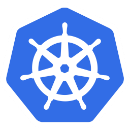ArgoCD: declarative Projects, Applications, and ArgoCD deploy from Jenkins0 (0)
19 May 2021
An application, cluster, or repository can be created In ArgoCD from its WebUI, CLI, or by writing a Kubernetes manifest that then can be passed to kubectl to create resources. For example, Applications are Kubernetes CustomResources and described in Kubernetes CRD applications.argoproj.io: [simterm] $ kubectl get crd applications.argoproj.io NAME CREATED AT applications.argoproj.io 2020-11-27T15:55:29Z [/simterm] And… Read More »
![]()



